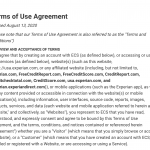
TripAdvisor Doesn’t Get Early Section 230 Dismissal–Putt v. TripAdvisor
Putt booked a tour through TripAdvisor’s subsidiary, Viator. On the tour, she suffered personal injuries. Putt sued TripAdvisor for negligence, misrepresentation, and more. Section 230. TripAdvisor invoked Section 230. The court says it’s too early to tell if TripAdvisor qualifies…

Continued Access to Service Not Sufficient to Bind User to New Terms of Service–Stover v. Experian
Stover signed up for an Experian subscription for credit monitoring in 2014. She alleged that Experian overstated the relevance of the credit report. She cancelled her subscription in 2014. In 2018, she accessed Experian’s website again, shortly before filing suit….

Planning to Sue Twitter Over an Account Suspension? YOU WILL LOSE–Murphy v. Twitter
Murphy engaged in deadnaming and misgendering in her tweets. Twitter repeatedly disciplined Murphy’s account until it finally permanently suspended the account. Murphy sued Twitter. The lower court ruled for Twitter on Section 230 grounds. The appeals court affirmed. This court…

Court Rejects Parler’s Demand That Amazon Host Its Services
Parler, a self-described “conservative microblogging alternative and [competitor] to Twitter,” sued Amazon Web Services for suspending its service. Parler claimed (1) antitrust violations, (2) breach of contract, and (3) tortious interference. Parler sought a temporary restraining order (which the court…
Facebook Isn’t Liable for Account Hack/Hijack–Damner v. Facebook
This is a pro se lawsuit. Damner claims his Facebook account was hacked in April 2020 and the hacker(s) took it over. He notified Facebook but allegedly it never responded. Damner sued Facebook for Stored Communications Act claims and others….
2H 2020 Quick Links, Part 5 (Contracts, E-Commerce, Defamation, Censorship, & More)
Contracts * Kidstar v. Facebook, Inc., 2020 WL 4382279 (D.N.J. July 31, 2020). The plaintiff sued Facebook because he lost access to photos in his account. assuming, arguendo, that Plaintiff opened a Facebook account in 2004, the 2009 User Agreement…
Laura Loomer Loses Another Lawsuit Related to Her Twitter Ban–Illoominate v. CAIR
This is the detritus of Laura Loomer’s lawsuit against Twitter for banning her account. A court previously dismissed those claims on Section 230 grounds. She also sued the Council on American-Islamic Relations Foundation (CAIR), claiming they complained to Twitter about…

Jury Will Decide If Videogame Character Infringes a Wrestling Persona–GI Bro v. Call of Duty
The plaintiff is a wrestler, primarily known as Booker T. When he wrestles for WWE, he used the stage name G.I. Bro. There’s also a comic book line based on the G.I. Bro character. The defendant makes the Call of…

Another Court Says Embedding Instagram Photos May Be Fair Use–Boesen v. United Sports
This is another Instagram embed case. For my most recent post on that topic, see this post. Plaintiff Boesen is a professional photographer. He captured an image of professional tennis player Caroline Wozniacki near the beginning of her career. Ms….
It’s Meshugenah to Operate a Streaming Mixtape Site–Atlantic v. Spinrilla
[Note: Meshugenah is Yiddish for “crazy.”] This is a brutal opinion. No matter how successful this defendant has been in the marketplace, copyright owner lawfare will almost certainly take it down. R.I.P. Spinrilla. Spinrilla is “a streaming and downloading service…
